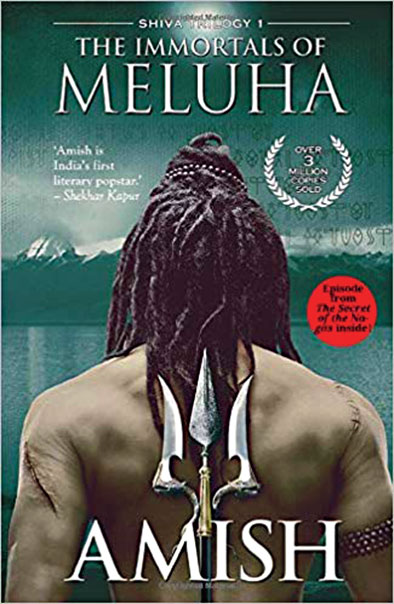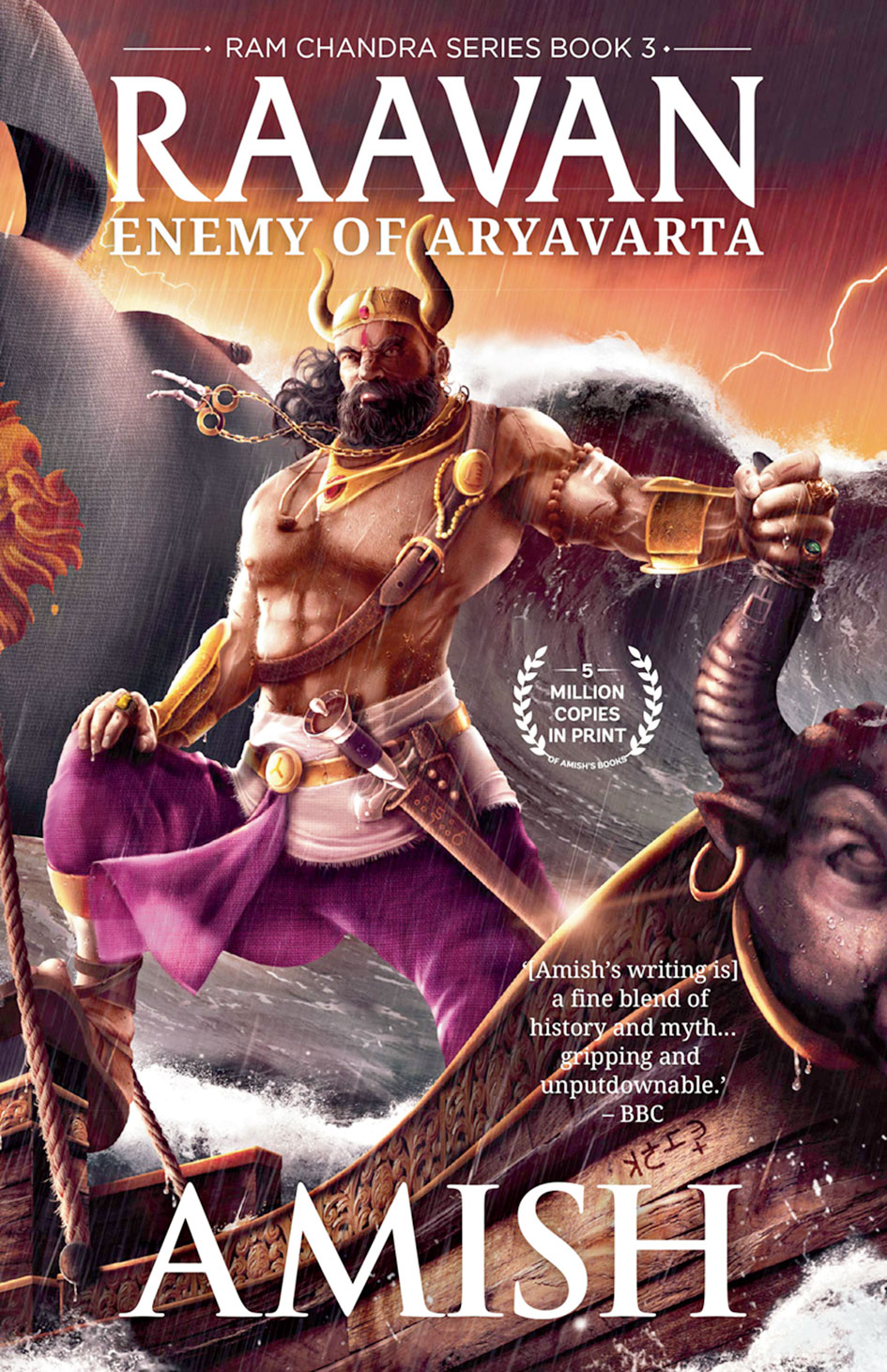Beyond the cheers and roars that make for a rockstar’s welcome for author Amish Tripathi everywhere he goes, there’s a maverick whose earnestness comes through in everything that he does — be it speaking about mythology to management students or, minutes later, talking about the progressive philosophy of his mythology-centred books with a journalist.
He is in a T-shirt that has the cover of his latest book — Raavan: Enemy of Aryavarta — when The Telegraph meets him on July 18 at the International Management Institute, Alipore, probably testimony to his belief that “there’s nothing called too much marketing”.
He says that he has miles to go before he sleeps and there seems to be a sense of urgency in everything that he does. That, perhaps, explains why he has managed to hold the attention of a nation with the youngest demography with his books that are deeply rooted in the mythology of the subcontinent. Excerpts.
How do you wear the hat of someone who made mythology cool for an entire generation along with that of being one of the highest-selling Indian writers in English?
I think it will be arrogant of me to start wearing those hats — that’s not me! But what I believe is that I am deeply committed to our culture and our land and, in my own small way, contribute to positive social change in the way the members of our society treat each other and what kind of a society we will become.
We should be a strong, powerful, liberal and inclusive society and that is what I’d like to say and I want to make my small contribution to it. It will be arrogant for me to think that I am wearing the hat of making mythology cool. No, no, I am not that big. But I want to make my own small contribution to a land that I deeply love.
I am the kind who stands up whenever the national anthem plays and I feel deeply patriotic. But to me, patriotism means celebrating the things that need to be celebrated and also wanting to change the things that need to be improved and that’s what drives me — deep love for this land!
Where does Raavan: The Enemy of Aryavarta figure in the Ram Chandra series? Didn’t this book have a different working title?
When Ram: Scion of Ikshvaku and Sita: Warrior of Mithila, the first two books of the five-book series, had released, the part of the story of Raavan that remained downloaded in my brain till then made it look like his own birth-land had abandoned him and, in a way, he was an orphan of Aryavarta. But as I started writing the story, I realised that actually it was the other way round. It wasn’t that his land had rejected him, it was he who had rejected his land. Often it makes him sound like a bechara, but actually he had more agency. So it was his decision and that thought was perhaps better conveyed by Enemy of Aryavarta than Orphan of Aryavarta, thus the decision to change the title.
But there’s a lesson I have learnt. Now, I am never going to declare the title before the book is actually ready. My readers did have a lot of fun with it and there were memes being posted on my page and I posted some of the funniest ones. There was one meme that had a cartoon character sweating profusely, looking confused, not knowing which of the two buttons to press with each of them titled as one of the titles of the book and saying that Amishji is confused about which title to pick. (Laughs)
Does the number of The Ramayana retellings in the industry make you nervous?
I think it’s fantastic that there are so many retellings because there is a lovely line in the Ramcharitmanas (Tulsidas’s Ramayana) that goes ‘Hari ananta, hari katha ananta’, which means that there are various forms of the lord and various stories of the forms of the lord. I don’t think we Indians will ever get bored of listening to the stories of our gods and goddesses from different perspectives. So the more the merrier because it just means that there is a lot more of exploring of our ancient culture, traditions and philosophies. So I put it from my perspective and others put it from theirs.

The Immortals of Meluha Book cover
Your books use Sanskrit words and phrases abundantly without a glossary. Is that a conscious decision?
You know, initially I had a glossary at the end; the first few editions of The Immortals of Meluha had a glossary. But what I realised is that people don’t normally expect a glossary in a fiction book. So most people don’t go to the back and check it. I need people to understand what I am saying and when I am saying it. So what I realised is that it’s probably better to explain it there itself. I want people to understand because at the core of what I want people to get are the philosophies. So if the readers are not getting swadharma when I am talking about it, then the entire philosophy will not be understood. So I might as well explain the meanings of these words where I am writing about them.
Since you self-published your first book, you have built yourself a brand, complete with trailers and music CDs. Was this how you always envisioned yourself becoming an author?
There’s no such thing as too much marketing! (laughs) To be honest, I never thought that I would be leading a life like this because my dream was more of getting a corner office in a bank and I had been working towards that and was doing well in my career. This was something that took my soul and was a story that I had to write.
The only thing that I was thinking of was that I had written a story that needed to be published and I wasn’t really thinking long-term. Often, the most beautiful journeys are the ones in which you don’t know what the destination is and you’re just enjoying the journey and, perhaps, that’s why this journey has been the most beautiful for me.
I still have no clue where I am going to go, but I am enjoying every moment because I get to do what I love doing and get to contribute to a land that I love and get paid for it — so it’s a good life!
Do you keep changing your books’ marketing strategies according to the demands of the time?
With the marketing, I have had a very good team, but, perhaps, the only credit you can give me is the ability to pick good ideas from the suggestions. There was a brilliant corporate leader called Andy Grove of Intel and he had written this book called Only The Paranoid Survive, which I had read many, many years ago. He says that the moment you start getting complacent, you will fail and you deserve to fail. So no matter where you are in life, you have to put in your 100 per cent every day. It is the reality of the universe because there are people competing with you all the time. There are a lot of very talented people who are fighting to get ahead.
Why do you find so many one-hit wonders, especially in the arts? Because that one success tends to distract. I am not saying that you shouldn’t enjoy your success, but if that’s all you do, when will you work? Yeah, only the paranoid survive!
While many hero-worship you, there’s also a degree of scepticism and maybe even conservatism. Does alienating a certain section bother you?
I try my best to not alienate as my stories are written from a perspective where I try and write a narrative in a way that includes everyone. In the Shiva trilogy, I have included parts of Nagaland and Tripura, and in the Ram Chandra series, I have included parts of Kashmir, Baluchistan, Tamil Nadu and Andhra Pradesh.
The lord Ram and Raavan story could easily have been written in a way that created a rift between the north and the south, but I haven’t written it that way at all. At least my intentions are correct and I try my best to be polite and inclusive. But some people may not accept it and that’s okay.
And what about the ones who swear by their Man Booker books?
That’s okay — them I don’t think too much about! It’s silly to have a bias against anyone — whether they speak British Raj-era English or not, whether they know Sanskrit or not. Let’s be honest, it’s not just a bias that the Lutyens’ elite has against ordinary Indians, the ordinary Indians also have a bias against them. We will go and ask them to pronounce amrut properly and they will have no clue and they will look down on others. In my mind, a bias towards any group is silly. I always look at it from one perspective and that is that goddess Saraswati could have blessed anyone. If she has blessed him/her, learn from that person. Who is the one who benefits when you learn from someone knowledgeable? You yourself! So what’s the harm?
Don’t let bias get in the way. And if someone else has bias, don’t waste your time engaging with that person because they draw your energy out. Focus your energy on your work, instead. You write your narrative in a way that’s inclusive and if someone else has bias, it’s not your lookout.
What has your own spiritual journey been like since you started writing about the Indian pantheon?
There’s been a 180° turn in my character, ya! If you had met me in my banking days, you wouldn’t have liked me. I was a very aggressive kind of guy who would shout and scream. But I am much calmer than I used to be. I am not saying become a doormat, but don’t be so crazy and aggressive that people find it difficult to work with you.
Do you think writing books on history and mythology is a double-edged sword?
Have you heard of any controversy about me? No, na? A lot of the times, many of the controversies are also created — let’s be honest. Sometimes there are genuine controversies also. But if you yourself are writing in a respectful way, it does not happen. My instinct is not to stir up controversy. I am not trying to please or displease anyone. But I also write the way that comes to me — I am not thinking of anyone. I genuinely worship our gods and goddesses. So my books end up coming out that way too.
After Shiva and Ram, which other mythological stories can we look forward to from you?
I have various story ideas — I have one based on The Mahabharata, one on lord Rudra, lady Mohini, lord Brahma, the rise of the Ashuras and Shukracharya. I have left clues for all the stories I will write in the next 20-25 years in my books.
My problem is that I have too many ideas and the pace at which I write, I will take many stories to my cremation pyre. So I desperately need to get more stories out. My obsession in life is that I can’t die without telling my stories.
Do you see yourself exploring mythology of other civilisations?
Yeah, yeah and I have left ideas again in my book. There’s an Egyptian story that I want to explore — the story of Akhenaten, and I have left a clue in the Shiva trilogy for that. There’s a story on the Mitannis, a story based in Southeast Asia.
When it comes to making mythology accessible and fun, I can’t help but bring up Neil Gaiman...
Yes, I really need to read him. I am an admirer, but, honestly, I haven’t read him.
And Gaiman’s Good Omens and American Gods are web series.
Yes, a contract has been signed for the Shiva trilogy, too, and let’s see what happens. Let’s wait for a bit and I will certainly announce it at the right time.
Outside of the media glare, what do you do? What do you read and watch?
I need to get a lot more productive, which is why outside of book launches, I don’t do a lot of interviews. You won’t see me wasting time anywhere — I only read and write.
I have just finished a book called Vada (Vada in Theory and Practice Studies in Debates Dialogues by Radhavallabh Tripathi), which is a non-fiction book and one of the best books I have ever read.
I tend to read two-three books simultaneously so I am reading Amitav Ghosh’s Gun Island and am a big fan of his and am reading Blood Island (Blood Island: An Oral History of the Marichjhapi Massacre by Deep Halder).
I last watched Game of Thrones and was very disappointed. What did they do, ya! They built it so perfectly and oh, god! What did they do! I was holding my head. Boss, these guys built perfection and then just blew it all up — what were they doing?!

Daenerys from Game of Thrones Still from the series
How would you have done it differently?
Okay, if it had to be that way, then they had to show a character arc developing differently. Daenerys’s character arc till now was that she was tough when she needed to be but she was noble. They didn’t show her as a mad queen and it is only right at the end that she started blowing up and that could also be loss of temper, which can happen to anyone. It didn’t fit her character. The entire build-up was that the world of magic was encroaching upon the world of men and suddenly, the entire world of magic meant nothing and was rendered redundant. The ending just didn’t fit the character arc.

Raavan: Enemy of Aryavarta is the third book in Amish’s Ram Chandra series Book cover
What’s the next book in the Ram Chandra series?
So the first three books have a multi-linear narrative. The first book was from the birth of lord Ram to the kidnapping of lady Sita, the second book was from her birth to her kidnapping and this book is from Raavan’s birth to the kidnapping of lady Sita. There’s a common narrative from the fourth book till the death of Raavan. The fifth and last book of the series will show lord Ram and his brothers and lady Sita go back and fight the battles that must be fought to establish Meluha. One of the ways of seeing the Ram Chandra series is as a 1,500-year prequel to the Shiva trilogy.
So that brings me to a probable working title for the next book…
Nah, I am not falling for that and you’re not catching me on that. There will be more memes on that and that’s not happening! (laughs)










